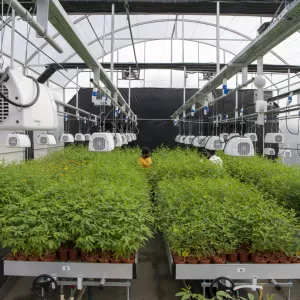ICRISAT to deliver world-class services as CGIAR's Breeding Resources South Asia Hub
Strategic collaboration to scale innovation and deliver harmonized, high-quality support across CGIAR partners’ breeding networks in South Asia Hyderabad, India | June 2025 – Original release published on ICRISAT website The International Crops Research Institute for the Semi-Arid Tropics (ICRISAT) will serve as the South Asia hub for Breeding Resources, part of CGIAR’s Breeding for Tomorrow (B4T) Science Program, which provides shared tools and services

ICRISAT to deliver world-class services as CGIAR's Breeding Resources South Asia Hub
Strategic collaboration to scale innovation and deliver harmonized, high-quality support across CGIAR partners’ breeding networks in South Asia
Hyderabad, India | June 2025 – Original release published on ICRISAT website
The International Crops Research Institute for the Semi-Arid Tropics (ICRISAT) will serve as the South Asia hub for Breeding Resources, part of CGIAR’s Breeding for Tomorrow (B4T) Science Program, which provides shared tools and services to accelerate crop improvement and agricultural innovation.
This agreement reflects a standardized implementation model: ICRISAT will provide shared breeding and research services in South Asia according to the same high standards, operational procedures and workflows used in other Breeding Resources hubs around the world, such as the International Rice Research Institute in Asia and AfricaRice in West and Central Africa hubs. This ensures that, regardless of who provides the service, it is carried out in the same way and with the same quality and value for breeders and researchers.
By adopting this system-wide model, ICRISAT is formally embedding Breeding Resources’ harmonized service delivery into its operations, building on a trusted and proven framework. Whether breeders from the region are from CGIAR or national research institutes, they can access services – from genotyping to phenotyping, and analytics to process management – delivered consistently across CGIAR Breeding Resources’ network of global hubs.

Why does this matter?
Breeding Resources’ strength lies in its ability to offer integrated, standardized, and evolving cost-effective services. Each regional hub operates as part of a connected ecosystem, where services follow the same Standard Operating Procedures (SOPs), use shared digital tools like the Enterprise Breeding System and Bioflow, and collect and process data in a harmonized way. This unlocks cross-Center and National Agricultural Research and Extension Systems (NARES) synergies, promotes continuous improvement, and supports CGIAR’s mission to deliver better varieties more efficiently and faster.
At ICRISAT, this includes in-house delivery of certain services – such as nutritional analysis through its Near-Infrared Spectroscopy (NIRS) services provided by the Facility for Exploratory Research on Nutrition (FERN) – but these are now delivered within the Breeding Resources framework, benefiting from shared business process management, quality control, and collaborative R&D.
This integration supports the vision of Breeding for Tomorrow (B4T), CGIAR’s global breeding Science Program, which aims to make food systems more productive, inclusive, and climate resilient. With its strategic location and decades of innovation across South Asia, ICRISAT is ideally positioned to strengthen regional breeding pipelines and develop the next generation of climate-smart crops.
“ICRISAT welcomes this opportunity to strengthen collaborative crop improvement as the breeding hub for South Asia. To date, we have developed 507 varieties of ICRISAT’s crops for the region and distributed 594,662 germplasm samples to 8 South Asian countries. With decades of regional breeding experience and advanced infrastructure, we are now ready to deliver standardized services that accelerate crop improvement and create a lasting impact across the region,” said Dr Himanshu Pathak, Director General of ICRISAT. “

“This hub illustrates ICRISAT Breeding Resources and B4T’s shared commitment to system-wide harmonization and scalable impact. Thanks to ICRISAT’s leadership, we are ensuring breeders across South Asia can rely on the same high-quality services, tools, and support – no matter where they sit in the network,” said Eng Hwa, Breeding for Tomorrow – Breeding Resources Area of Work Lead.
Shared services for faster, smarter crop development
Through the Breeding Resources Service Request Portal, CGIAR and partner users can find five types of services, composed as follows (some of which are provided directly by ICRISAT):
1. Genotyping and Sequencing Services: Understanding plant DNA to identify traits like drought resistance or high yield.
- DNA extraction
- Genotyping (low-density, mid-density, and high-throughput)
- Sequencing
2. Elemental and Compositional Analysis: Quick, non-destructive testing of crops to boost food quality, supporting the development of more nutritious and valuable food and feed.
- Near Infrared Spectroscopy (NIRS) for protein, fatty acids, oil, moisture, and fodder quality traits (non-destructive; allows assessment of 200–300 samples per day and multiple traits simultaneously)
- X-Ray Fluorescence (XRF) for mineral elements like iron, zinc, and calcium (non-destructive, 200-250 samples per day)
3. Data Analytics Support: Turning raw data into decisions.
- Scaling of Bioflow, CGIAR breeding analytics pipeline, across Centers and partners
- Implementation and troubleshooting of the Enterprise Breeding System, CGIAR breeding data management platform, in South Asia
4. Breeding Operations Support: Improving variety development and trial efficiency.
- Support for trials, nurseries, and seed multiplication
- Seed-to-seed operations, including land preparation, pre- and post-harvest data capture, irrigation systems, harvesting, and seed processing
- Use of Rapid Generation Advancement (RGA) technologies, including Speed Breeding
5. Business Process Management: Improving how breeding is done.
- Creation of Standard Operating Procedures (SOP) and Research Operational Standards, to improve core processes and enhance productivity, quality and efficiency, as well as customer satisfaction
- Capacity building resources, aiming to improve processes and foster the adoption of new technologies where needed, with both in-person and virtual training programs
With this new hub, ICRISAT and its partners will unlock faster crop improvement cycles and improve access to breeding tools across South Asia.
Main image: The Rapid Generation Advancement (RGA) facility at ICRISAT. Credit: ICRISAT.
Resources:
- HarvestPlus and ICRISAT to support CGIAR biofortification strategy through elemental analysis
- Learn more about Breeding Resources
- Order services via the CGIAR Service Request Portal
- Download Breeding Resources catalogue of services


